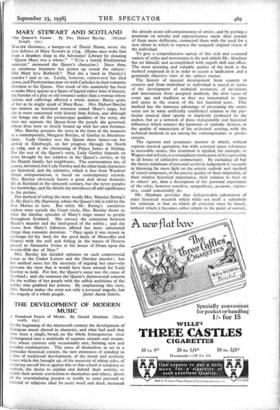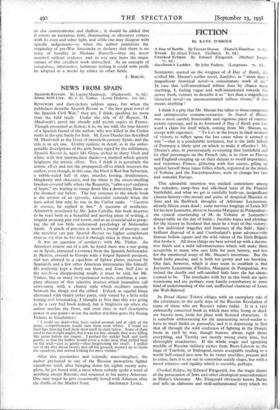THE DEVELOPMENT OF MODERN MUSIC
A Hundred Years of Music. By Gerald Abraham. (Duck- worth. z5s.) IN the beginning of the nineteenth century the development of European music altered in character, and what had until that time been a single, broad, on the whole homogeneous river disintegrated into a multitude of separate streams and stream- lets, whose currents only -occasionally met, forming new and peculiar combinations. The sense of themselves as set in a particular historical context, the new awareness of standing in a line of traditional development, of the moral and aesthetic issues which this brought up, of the necessity of taking sides, of declaring oneself for or against this or that school or tendency or outlook, the desire to explain and defend their activity, to Justify their artistic convictions to themselves and others, above all the overwhelming passion to testify to some personal or national or religious ideal by every word and.deed, increased
the already acute self-consciousness of artists, and by putting a premium on novelty and expressiveness made their pursuit of them more deliberate, connected them with the need for a new idiom in which to express the uniquely original vision of the individual.
To give a comprehensive survey of this rich and scattered variety of styles and movements is the task which Mr. Abraham has set himself, and accomplished with superb skill and effect. The most arresting and valuable quality of his book is the method employed in it in order to secure a 'unification and a genuinely objective view of the subject matter.
The history of musical development from country to country and from individual to individual is traced in terms of the development of technical resources, of deviations and innovations from accepted methods, the idees refues of every age and tradition as they are transmitted in time and space in the course of the last hundred years. This method has the immense advantage of presenting the entire scene not in some artificially established relation to the par- ticular musical ideal openly or implicitly professed by the author, but as a network of those indisputably real historical influences which connect the harmonic or melodic devices, or the quality of mannerism of his orchestral scoring, with the technical methods in use among his contemporaries or prede- cessors.
The rigorous and systematic manner in which, without copious musical quotation, but with constant exact references to accessible scores, this treatment is applied, for example, to Wagner and to Liszt, is a triumphant vindication of its superiority to all forms of subjective commentary. By excluding all but the barest minimum of personal aesthetic judgement it succeeds in throwing far more light on the artistic outlook and method of varied composers, of the precise quality of their originality, of their relative historical importance, their relation to their or to others' art, than a description of the personal experience of the critic, however sensitive, sympathetic, accurate, expres- sive, could conceivably do.
Mr. Abraham provides that indispensable substratum of exact historical research which while not itself a substitute for criticism is that on which all criticism must be based, without which it becomes either simple to the point of naiveté, or else conversational and shallow ; it should be ,added that it covers an enormous field, illuminating its obscurest corners with its even and sober light, and while one may disagree with specific judgements—as when the author minimises the originality of pre-War Stravinsky or declares that there is no trace of banality in Madame Butterfly—they are never asserted without evidence and in any case leave the major virtues of this excellent work untouched. As an example of scrupulous, informative, luminous writing it could with profit be adopted as a model by critics in other fields.
I. BERLIN.







































 Previous page
Previous page